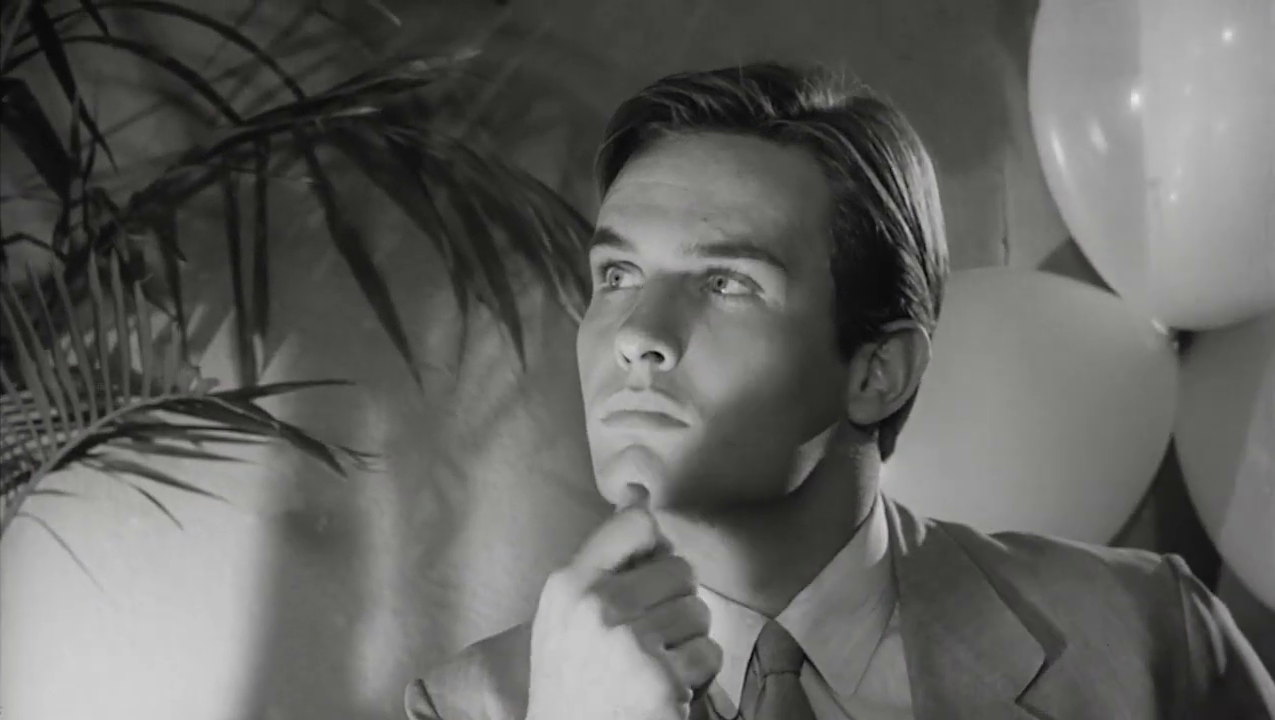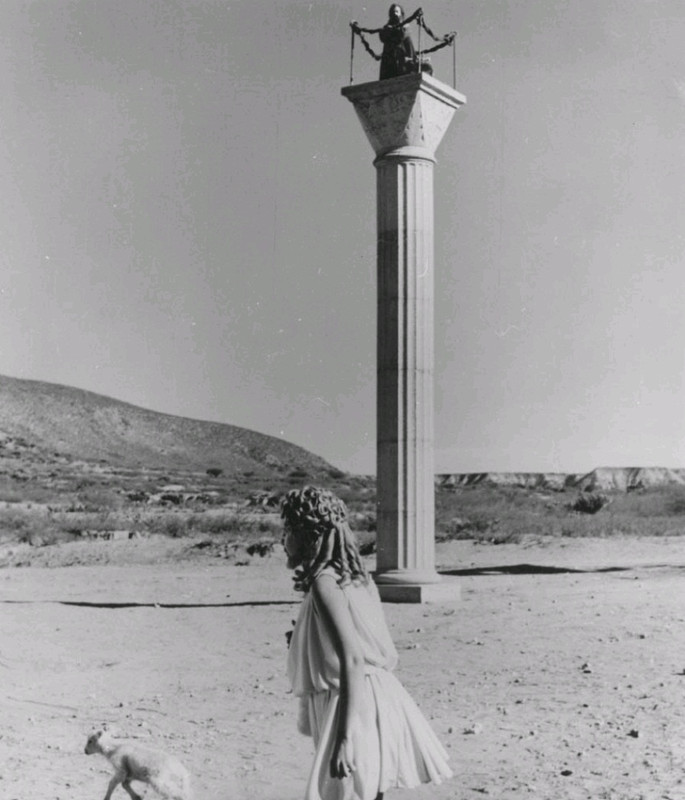“Dragoljub
Son of our native land!
Teeth and muscles,
Tried and true
All our hearts go out to you!” “When they hammer your head,
The skull is hard,
And never cracks,
Mother's little babe of steel!
Dragoljub
Son of our native land!”Nevinost bez zaštite [Innocence Unprotected] (Dušan Makavejev, 1968)
May
25
Tap Dance Day

A woman tap dancing on top of the raised barrel of a very large cannon in a circus tent. This scene, lifted from Цирк [Tsirk / Circus] (DPs: Grigoriy Aleksandrov & Isidor Simkov; DPs Vladimir Nilsen & Boris Petrov, 1936) inspired Dragoljub Aleksić – a trained blacksmith – to build his own cannon to shoot people out off. DPs: Branko Perak & Stevan Mišković.
Nevinost bez zaštite is a treasure trove. Of fantastic people, feats, footage, and genres. We sit down to watch #Serbia's first feature talkie, also named Nevinost bez zaštite (1943), and are joined by the people who created it.
While they speak, and occasionally burst out into song, about living in Yugoslavia under Nazi, then communist control, we meet Dragoljub!, the movie's lead with the jaws of steel. A man of great works, humanitarian and other, demonstrates his iron will. And while so, we all, starstruck and in love, sing:
1960s
“Sir John MacDonald, Jacobite captain of cavalry. Aged, frequently intoxicated, described as 'a man of the most limited capacities'.”Culloden (Peter Watkins, 1964)
May
23

Wigged man at a table, drinking wine with three men lower in rank standing behind them with their arms crossed. DP: Dick Bush.
– narrator
– Yes, I love the sea most of all. But I'm afraid of it, too. – I guess we're all a little afraid of what we love. Night Tide (Curtis Harrington, 1961)
May
22
National Maritime Day

Johnny Drake (Dennis Hopper) and Mora (Linda Lawson) in front of her joint that reads “MORA the MERMAID. ALIVE! LOVELY SIREN of the DEEP”. The sideshow's mural, and presumably the lettering too, were painted by Kenneth Anger associate Paul Mathison, both part of (Marjorie) Cameron's Magick Circle. DPs: Vilis Lapenieks & Floyd Crosby.
On the Santa Monica pier, sailor Johnny falls in love with one of the attractions of the local #sideshow, Mora the Mermaid. As people warn Johnny about the faith of Mora's previous suitors, captivated, he becomes convinced that she is a real siren, planning his downfall.
Night Tide is a vital key to understanding the odd connection between Hollywood and the workings of #Thelema. Several involved – Marjorie Cameron (as the “Water Witch”), #drag trapeze artist and once-Jean #Cocteau's lover Barbette – moved in Thelemic and related #occult, #esoteric circles. Painter Paul Mathison, Night Tide extra and crew member, created backdrops for the works of the great Lucifer himself, #KennethAnger.
This, lost dreamlike L.A. is gone; a treasure like Night Tide serves as a reminder of a more spellbinding Hollywood.
“Ladybug, ladybug,
Fly away home”Ladybug Ladybug (Frank Perry, 1963)
May
21
the End Of The World

In a scene evoking Ingmar Bergman's Det sjunde inseglet [The Seventh Seal] (1957), one of the older girls leads the younger children in dance on top of a hill. Their teacher Mrs Andrews (Nancy Marchand) plus two of her students walk along. DP: Leonard Hirschfield.
It's another school day in rural America when the #NuclearAttack alarm starts ringing. A teacher, instructed to calmly walk the kids home, tries to keep the youngest ones oblivious of the impending doom.
children's song
While the children walk, talk and sing, this thing up there, in the sky and in the mind, grows bigger.
“We are now entering the century of the soul!”Manden der tænkte ting [The Man Who Thought Life] (Jens Ravn, 1969)
May
12
National Hospital Day

A man in black (Preben Neergaard) seen from the back looks into an operating room. DP: Witold Leszczyński.
A strange man arrives at neurosurgeon Dr Max Holst's #hospital one day. So strange in fact that he's promptly send to the psychiatric ward. This man, a Mr Steinmetz, insists on the doctor's help. He can materialise things – look see here's a cigar – but living things is what he wants. This bird, it died. Can the doctor help? No no, not the bird, the brain! Steinmetz has set up a theatre in his home, it can be done there. While the doctor, however tempted, refuses, Steinmetz evolves.
– Steinmetz
Manden der tænkte ting intrigues in its clinical monotonous settings, its pale late-60s stock, and precise composition. Early Cronenberg – Stereo (Tile 3B of a CAEE Educational Mosaic) (1969) and Crimes of the Future (1970) – comes to mind and, of course Lars von Trier's majestic Riget [The Kingdom] (1994 – 2022). But only Jens Ravn mastered this strangling lightness. Slowly, while you count backwards. Now you no longer feel the straps. 10… 9… …
“It's not my fault that opportunity came my way.” Rat Fink [My Soul Runs Naked / Wild and Willing] (James Landis, 1965)
May
11
World Ego Awareness Day

Real-world teen pop idol Schuyler Hayden as Lonnie. He's very pretty, and pensive, sitting in front of a potted palm and balloons, this thumb up to his chin. His face and eyes are lit in such a way that he looks strangely sinister. DP: Vilmos Zsigmond.
Pretty boy Lonnie gets what he wants. And he wants to be out of where he came from, and he wants to be wanted and rich. And he's got the looks and the voice and the ego. So he gets it, the getting out and the love and the money. And then some. And then some. And then.
– Lonnie
Rat Fink is not your pop-idol-turned-movie-star vehicle. Something's off, no good vibrations here. It's dark – not in the least thanks to cinematographer Vilmos “The Deer Hunter” Zsigmond's doings – and gritty – real-world pop singer Schuyler Hayden doesn't hold back in his portrayal of egomaniacal pretty boy Lonnie.
If it hadn't been lost for half a century you may be fooled to believe that it spawned a certain, fictional 80s investment banker.
“Do you think that not getting caught in a lie is the same as telling the truth?”The Slender Thread (Sydney Pollack, 1965)
May
10
National Washington Day

Lobby card. Psychology student Alan Newell (Sidney Poitier), hands in pockets, phone tucked between ear and shoulder, pacing up and down his office in the Crisis Clinic. DP: Loyal Griggs.
Expecting an uneventful night at the Seattle Crisis Clinic, volunteering psychology student Alan Newell is left to his own devices. Alan takes his books to study, it is quiet after all. Then a call, a woman. We learn she's called Inga (Anne Bancroft). She's drowsy. She has taken barbiturates and wants to talk while slipping away. While Alan fights to keep the woman on the line, attempts are made to trace the call.
– Mark Dyson
The Slender Thread is an excellent example of picturing the invisible. The two leads never meet, both bound to their setting. The call tracing scene, a very technical affair, bears echos of Soviet Montage. The warm #jazz soundtrack by Seattle's own Quincy Jones tones down the mechanics, making the human aspect even more harrowing, almost physical.
“And the water up there. Remember? That transparent, light green water. It felt different. God, what a beautiful feeling. We could've swum around the world in those days.”The Swimmer (Frank Perry + Sydney Pollack, 1968)
May
6
Beverage Day

Swimmer Ned Merrill (Burt Lancaster) reaching for a drink handed to him by someone offscreen. DP: David L. Quaid.
At a poolside #CocktailParty, the swimmer appears. He notes that the houses in between his hosts' and his are connected by a “river” of #pools and decides to swim home, from one pool to the other, superficially meeting people, crashing suburban pool parties, in an increasingly irrational state.
– Ned Merrill
“Come down off that column. Taste earthly pleasures till you've had your fill. Till the very word pleasure fills you with nausea.”Simón del desierto [San Simeón del desierto / Simon of the Desert] (Luis Buñuel, 1965)
May
4
National Day Of Prayer

A young, bearded person in toga and a lamb pass Simón (Claudio Brook), praying on top of his pillar. DP: Gabriel Figueroa.
Simón is a stylite in the Syrian #desert on top of a pillar, close to God, #praying. People gather and pray to him, Simón. Simón prays for the people, the animals, himself.
– The Devil
As with anyone who believes in the concept of #sin, or desires to be free of sin, sin comes to Simón.
憂國 [Yūkoku / Patriotism or the Rite of Love and Death] (Yukio Mishima, 1966)
May
1
Loyalty Day

Shinji Takeyama (Yukio Mishima) and Reiko (Yoshiko Tsuruoka). In a quiet framed still, Shinji lays on a tatami mat in full uniform. Reiko rests her head on his chest. Both have their eyes closed. DP: Kimio Watanabe.
Japanese author Yukio Mishima was, besides an aesthete, a fierce proponent of Japanese nationalism. In 憂國, based on his short 1960 story, Mishima plays palace guard Lt. Shinji Takeyama. Despite being one of the instigators of an ultra-nationalist coup, Takeyama decides he cannot overthrow the government as it would mean having to kill his friends and be disloyal to the Emperor. Returning home, he and his bride Reiko (Yoshiko Tsuruoka) perform #切腹 (#seppuku / #HaraKiri), as in line with Takeyama's #samurai heritage.
Yūkoku is a #SilentFilm that plays out like #Noh #theatre, with an extreme emphasis on the beauty and love of death and loyalty respectively.
After Mishima's own seppuku in 1970, his widow ordered all copies of Yūkoku to be destroyed. In 2005, in Mishima's house, a pristine copy was uncovered in a tea box.